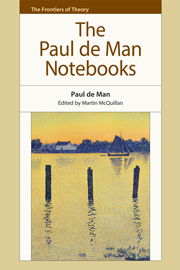Book contents
- Frontmatter
- Contents
- Series Editor's Preface
- Acknowledgements
- Dedication
- Introduction: ‘The Unimaginable Touch of Time’: The Public and Private in the Notebooks of Paul de Man
- PART I Texts
- 1 The Drawings of Paul Valéry (1948)
- 2 Jacques Villon (1952)
- 3 Graduate Essay on Keats (1954)
- 4 Postdoctoral Essay on Symbolism (c. 1960)
- 5 Introduction to Madame Bovary (1965)
- 6 Introduction to The Portable Rousseau (1973)
- 7 On Reading Rousseau (1977)
- 8 Translator's Introduction to “Rousseau and English Romanticism” (1978)
- 9 Rousseau and English Romanticism (1978)
- 10 Introduction to Studies in Romanticism (1979)
- 11 Hommage à Georges Poulet (1982)
- 12 A Letter from Paul de Man (1982)
- 13 Reply to Raymond Geuss (1983)
- 14 Interview with Robert Moynihan (1984)
- PART II Translations
- PART III Teaching
- PART IV Research
- Appendix. The Notebooks of Paul de Man 1963–83
- Bibliography
- Index of Names
8 - Translator's Introduction to “Rousseau and English Romanticism” (1978)
from PART I - Texts
Published online by Cambridge University Press: 05 December 2014
- Frontmatter
- Contents
- Series Editor's Preface
- Acknowledgements
- Dedication
- Introduction: ‘The Unimaginable Touch of Time’: The Public and Private in the Notebooks of Paul de Man
- PART I Texts
- 1 The Drawings of Paul Valéry (1948)
- 2 Jacques Villon (1952)
- 3 Graduate Essay on Keats (1954)
- 4 Postdoctoral Essay on Symbolism (c. 1960)
- 5 Introduction to Madame Bovary (1965)
- 6 Introduction to The Portable Rousseau (1973)
- 7 On Reading Rousseau (1977)
- 8 Translator's Introduction to “Rousseau and English Romanticism” (1978)
- 9 Rousseau and English Romanticism (1978)
- 10 Introduction to Studies in Romanticism (1979)
- 11 Hommage à Georges Poulet (1982)
- 12 A Letter from Paul de Man (1982)
- 13 Reply to Raymond Geuss (1983)
- 14 Interview with Robert Moynihan (1984)
- PART II Translations
- PART III Teaching
- PART IV Research
- Appendix. The Notebooks of Paul de Man 1963–83
- Bibliography
- Index of Names
Summary
De Man presented Rousseau et le romantisme anglais at the University of Geneva on June 5, 1978, as the last in a series of eight guest lectures commemorating the bicentennial of the deaths of Rousseau and Voltaire. The lecture is a shorter variant of what appeared as “Shelley Disfigured” in the 1979 collection Deconstruction and Criticism. For that work, Bloom and Hartman had asked de Man, Miller, and Derrida to contribute essays on Shelley's Triumph of Life in order, as Hartman writes in the preface, both to acknowledge “the importance of Romantic poetry” and to demonstrate the “shared set of problems” preoccupying this group. “Shelley Disfigured” was republished in de Man's 1984 retrospective collection of essays The Rhetoric of Romanticism, where he singles out the essay as “the only place where [he came] close to facing [the] questions about history and fragmentation” that resurged upon his looking back over twenty-five years of his work on Romantic literature.
To publish this English translation of a French variant of “Shelley Disfigured” is to revisit the issues of fragmentation and monumentalization that frame that essay (not to mention de Man's own definition of translation as a “desacralization of the original”). Given the relative proximity between a lecture given in June 1978 and an essay published in December 1979, it is impossible to determine which preceded the other in terms of a coherent, genetic narrative.
- Type
- Chapter
- Information
- The Paul de Man Notebooks , pp. 103 - 106Publisher: Edinburgh University PressPrint publication year: 2014

